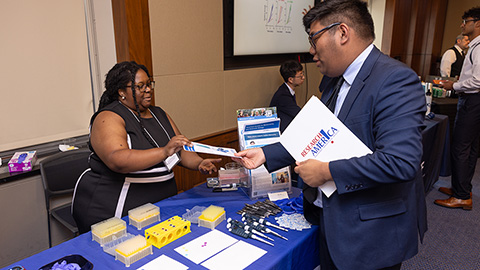ASBMB calls for broad federal effort to support scientists with disabilities
The American Society for Biochemistry and Molecular Biology released a statement on Jan. 31 endorsing the National Institutes of Health’s recent report detailing actions the agency should take to support disabled scientists.
The ASBMB’s advocacy team said that it is encouraged by the effort the NIH is making to support disabled scientists. However, ASBMB’s public affairs director, Sarina Neote, said that all federal agencies should follow NIH’s lead.
“NIH has taken an important first step. We hope that they will be an example for all federal agencies to follow suit and support the often-overlooked disability community,” she said.
In addition to calling for immediate implementation of the subgroup’s recommendations, the society urged NIH to:
-
Incorporate anti-ableism into all its diversity initiatives and communications
-
Establish funding opportunities for disability research.
In accordance with the subgroup’s recommendations, the ASBMB emphasized that NIH’s mission statement must be updated to eliminate ableist language.
The society wrote, “Individuals with disabilities make up 26% of the U.S. adult population, according to the Centers for Disease Control and Prevention. However, their representation in science remains low. The National Science Foundation found in 2019 that 9% of academic scientists self-reported having disabilities. Meanwhile, only 1.2% of NIH-funded principal investigators reported having disabilities.”
Most laboratory setups and equipment are configured for able-bodied users, which presents a systemic challenge for disabled individuals interested in STEM, and few resources exist to aid principal investigators in designing an accessible lab.
According to the NIH, many disabled scientists are unable to take part in professional development activities such as networking events because they are often designed with only able-bodied participants in mind. This inaccessibility has only been exacerbated by the COVID-19 pandemic.
“Disabled scientists are a vital part of the scientific workforce who provide unique scientific perspectives to the community,” the society wrote. “Without more representation of scientists with disabilities, the biomedical sciences will continue to lag in advances in disability-related research and its promise of equity.”
Neote said the ASBMB is encouraged by NIH’s leadership in this area and that her team looks forward to working with NIH to implement these important provisions.
Enjoy reading ASBMB Today?
Become a member to receive the print edition four times a year and the digital edition monthly.
Learn moreGet the latest from ASBMB Today
Enter your email address, and we’ll send you a weekly email with recent articles, interviews and more.
Latest in Policy
Policy highlights or most popular articles

Embrace your neurodivergence and flourish in college
This guide offers practical advice on setting yourself up for success — learn how to leverage campus resources, work with professors and embrace your strengths.

ASBMB honors Lawrence Tabak with public service award
He will deliver prerecorded remarks at the 2025 ASBMB Annual Meeting in Chicago.

Summer internships in an unpredictable funding environment
With the National Institutes of Health and other institutions canceling summer programs, many students are left scrambling for alternatives. If your program has been canceled or delayed, consider applying for other opportunities or taking a course.

Black excellence in biotech: Shaping the future of an industry
This Black History Month, we highlight the impact of DEI initiatives, trailblazing scientists and industry leaders working to create a more inclusive and scientific community. Discover how you can be part of the movement.

ASBMB releases statement on sustaining U.S. scientific leadership
The society encourages the executive and legislative branches of the U.S. government to continue their support of the nation’s leadership in science.

ASBMB and advocacy: What we accomplished in 2024
PAAC members met with policymakers to advocate for basic scientific research, connected some fellow members with funding opportunities and trained others to advocate for science.

